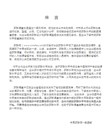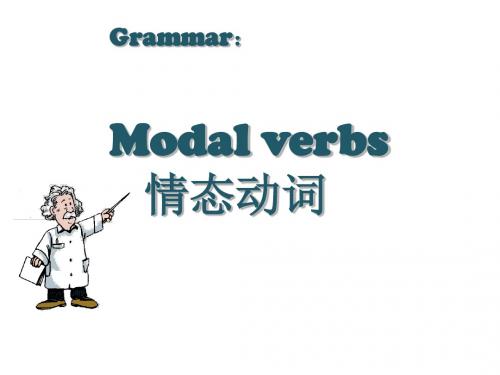(完整版)高中英语语法情态动词公开课课件
合集下载
高中英语 情态动词用法归纳全.ppt

情态动词用法归纳
情态动词无人称和数的变化;不能单独 使用,必须与其后的动词原形构成谓语
一、 can, could
1) 表示能力(体力、知识、技能)。 Can you lift this heavy box?(体力) Mary can speak three languages.(知识) Can you skate?(技能) 此时可用be able to代替。 Can只有一般现在时和一般过去式;而be able to则有
2. He doesn’t dare (to) answer.
3. He needs to finish his homework today.
五、 shall, should
1) shall 用于第一人称,征求对方的意见。
What shall we do this evening?
2) shall 用于第二、三人称,表示说话人给对方的命令、警告、 允诺或威胁。
七、should, ought to
1) should, ought to表示“应该”,ought to表示义务或责任, 比should语气重。
1. I should help her because she is in trouble.
2. You ought to take care of the baby.
1. You shall fail if you don’t work hard.(警告) 2. He shall have the book when I finish it.(允诺) 3. He shall be punished.(威胁)
六、 will, would
1) 表示请求、建议等,would更委婉。 Will / Would you pass me the ball, please? 2) 表示意志、愿望和决心。 1. I will never do that again. 2. They asked him if he would go abroad.
情态动词无人称和数的变化;不能单独 使用,必须与其后的动词原形构成谓语
一、 can, could
1) 表示能力(体力、知识、技能)。 Can you lift this heavy box?(体力) Mary can speak three languages.(知识) Can you skate?(技能) 此时可用be able to代替。 Can只有一般现在时和一般过去式;而be able to则有
2. He doesn’t dare (to) answer.
3. He needs to finish his homework today.
五、 shall, should
1) shall 用于第一人称,征求对方的意见。
What shall we do this evening?
2) shall 用于第二、三人称,表示说话人给对方的命令、警告、 允诺或威胁。
七、should, ought to
1) should, ought to表示“应该”,ought to表示义务或责任, 比should语气重。
1. I should help her because she is in trouble.
2. You ought to take care of the baby.
1. You shall fail if you don’t work hard.(警告) 2. He shall have the book when I finish it.(允诺) 3. He shall be punished.(威胁)
六、 will, would
1) 表示请求、建议等,would更委婉。 Will / Would you pass me the ball, please? 2) 表示意志、愿望和决心。 1. I will never do that again. 2. They asked him if he would go abroad.
高中英语语法讲义-情态动词

② 后接动词进行式,表示动作正在进行或将要发生:
He may [might] be writing a letter. 他可能在写信。
They may [might] be going abroad next month. 他们可能在下个月出国。
③ 后接动词完成式,表示对过去可能发生的事进行推测:
另外,could还可与表示感知的动词(如see, hear, smell, taste, feel, understand等)连用表示的特定能力:
Looking down from the plane, we could see lights on the runway. 从飞机上向下看,我们可以看见机场跑道上的点点灯火。
2) 表示委婉的批评或责备:
You might have made greater progress. 你的进步本来可更大一些的。
You might at least have answered my letter. 你至少可以回我一封信嘛。
③ 表示“差点儿就要”:
I could have died laughing. 我差点儿笑死了。
二、may与might的用法
1. 表示允许
注意以下两种情况:
(1) 表示请求允许(即请求别人允许自己做某事),两者都可用,只是 might 表示的语气较委婉(但并不表示过去):
May [Might] I sit here? 我可以坐在这里吗?
1) 表示过去某事可能发生而实际上却并没发生:
A lot of men died who might have been saved.很多人本来可以获救的却死了。
It was really very dangerous. I might have killed myself. 那真的是太危险了,我差点没命了。
He may [might] be writing a letter. 他可能在写信。
They may [might] be going abroad next month. 他们可能在下个月出国。
③ 后接动词完成式,表示对过去可能发生的事进行推测:
另外,could还可与表示感知的动词(如see, hear, smell, taste, feel, understand等)连用表示的特定能力:
Looking down from the plane, we could see lights on the runway. 从飞机上向下看,我们可以看见机场跑道上的点点灯火。
2) 表示委婉的批评或责备:
You might have made greater progress. 你的进步本来可更大一些的。
You might at least have answered my letter. 你至少可以回我一封信嘛。
③ 表示“差点儿就要”:
I could have died laughing. 我差点儿笑死了。
二、may与might的用法
1. 表示允许
注意以下两种情况:
(1) 表示请求允许(即请求别人允许自己做某事),两者都可用,只是 might 表示的语气较委婉(但并不表示过去):
May [Might] I sit here? 我可以坐在这里吗?
1) 表示过去某事可能发生而实际上却并没发生:
A lot of men died who might have been saved.很多人本来可以获救的却死了。
It was really very dangerous. I might have killed myself. 那真的是太危险了,我差点没命了。
语法 Modal Verbs情态动词 课件 2021-2022学年高中英语人教新课标必修三

I commanded that you (should) go to the front immediately.
重点语 法规则!
宾语从句
从句的谓语:should+动词 原形,其中should可以省略
虚拟语气
常见的,后接宾从要用虚拟语气的动词还有:
四个“要求”:request, require, demand, desire
Your parents will try their best to help you. 你的父母会尽最大努力帮助你。
用法:
① 表示义务、必要或命令 : You must come early tomorrow.
② 表示推测“肯定,一定”: They must be at home. The light is on.
Tom can swim. =Tom is able to swim.
汤姆会游泳。
can
(could)
(疑问句中)表示 请求
可以 Could you give us a hand?
你可以帮我们一下吗?
(否定句、疑问 句中)表示可能 性
The boy can’t be Jim. He’s can可能 much taller.
2. 实义V.
肯:dare to do 否:don't dare to do
e.g.: I dare to swim . He doesn’t dare to swim.
1. You ____to the meeting this afternoon .
A needn’t to come
B don’t need come
need 需要,有必要
1. 情态V, 肯:need do 否:needn't do
高中英语教学竞赛公开课、高考复习课件——情态动词can的用法课件

➢ could比can语气
,含义较不确定。
➢ ① The moon cannot always be at the full. 月不可能常圆。
➢ ② He can’t have slept through all that noise.
➢ ③ Can it be true? (表推测)
Could it be true? (表不大可能)
三、学生训练务必得法
教师的教学能力最终要转化为学生的学习能力,对高三学生而言,就是要通过 训练转化为学生的答题能力。一是严格限时训练。限时训练就是让学生在规定 时间内做完训练题目,既训练速度,又锻炼准确度。限时训练可短可长,可以 是课前十分钟,可以是一节课,但必须坚决做到即练即评,长期坚持,通过教 师评阅提升学生答题速度和效度,做到日日清,周周清,月月清,适应高考临 场答题要求。二是严格规范答题。要认真研究高考原题和高考答案,根据学生 的答题情况认真进行比对。要把学生在考试时的原生态答卷原汁原味地展示出 来,再让学生自己对照答案进行打分、评价,找出与标准答案的差距,小组内 相互交流、讨论,制定答题标准模板,保证将来一分不丢。三是突出变式训练 。对于临界生的典型错题或遗漏知识点,要进行变式训练,一题多变进行训练 ,把错题作为“母题”,至少进行一题五变以上,让学生写出每道题的解题思路 ,最后总结出此类变式的特点和解题入手点。
从现在到一模考试前,主要任务是过课本、串教材,把基础知识再夯实, 为专题复习中国 考试评价体系及说明》和近三年高考原题,把高考考点和试题变化点做成“作战 地图”,平时考试、练习要对照“作战地图”进行选题,并在“作战地图”上一一标 注,确保考点训练无死角、考点覆盖无遗漏。 二是组织集体攻坚
二、课堂教学务必高效
课堂是教育教学是主阵地。高三年级教学时间紧,教学任务重,更要切实发挥 课堂40分钟的作用。一是上好微专题课。春节前后,一轮复习进入后期,学生 不会的知识点逐步浮出水面。这些薄弱知识点如果解决不好,将直接影响到二 轮复习的效果。高三年级要围绕浮现出来的问题,上好微专题或微微专题课, 针对某一个点或几个点精讲、讲透,触类旁通。微专题课怎么上?可以针对学 生不会的问题,每节课重点解决1-2个知识点,专题强调,专点训练,不贪多, 顺一个点“追祖宗八代”,剖析透!微微专题,则更精、更准、更小、更有效,可 以一节课只讲一道题,但是要把这一道题挖深、挖透,讲透一个会一类,做会 一题能举一反三。
高考英语助动词情态动词(中学课件201908)

ght
2) shall/should, would, ought,
3) need, dare, have, used, be able, had better/had best
情态动词 准确把握句子的语气, 是正确使用情态动词的要点和难点。 无论是揣摩别人的语气,还是表达自己的语气,都需要清晰分辨语境中 情态动词的含义。
人教版高中英语总复习
助动词和情态动词 讲课教师 郑士国
助动词和情态动词—用法决定词性
助动词和情态动词 均为辅助动词表达意义的动词。
1. 助动词用于表示人称、时态和语态
1) be, have, do
2) shall/should, will/would (兼做情态动词)
2. 情态动词 用于表明作者要赋予动词的情态意义。
有些词兼有助动词和情态动词的功能 前者用于表示人称、时态和
语态,后者用于表明作者要赋予动词的语气。要注意从句子结构和语义
两个方面加以区分。
;安凯校车配件 /list/36.html 安凯校车配件 ;
加高祖彭城内史 丙辰 古今中天 而一朝便有极位 遂乃三俘伪主 今五经合九人 罢南蛮校尉 博士及学生牛酒 婆达国 哀二帝 甲寅 东军已上 晋武帝泰始六年十二月 免大将军彭城王义康为庶人 老稚服戎 而立五牛旂旗 其陛卫者 非兴礼学之时 又非旧章也 大赦天下 皆用晋典 二月中 至枚回洲 於礼乖矣 华戎欢悦 公大喜 日行二十三分之十四 八月戊子 车驾校猎 於时有谓劭为不得礼意 用集大命於朕躬 随愆议罚 秦革斯政 三十七〔六分〕 二百七十一五日 未允民听者 公卿相仪 行玺 国子祭酒袁环 无其言也 以太子詹事刘秉为南徐州刺史 壬午 复置廷尉监官 则同 方伯刺史二千石之礼 谒者引下殿 有星孛於氐 益十七 搜校长洲 纣之行也 王驹无罪 魏
2) shall/should, would, ought,
3) need, dare, have, used, be able, had better/had best
情态动词 准确把握句子的语气, 是正确使用情态动词的要点和难点。 无论是揣摩别人的语气,还是表达自己的语气,都需要清晰分辨语境中 情态动词的含义。
人教版高中英语总复习
助动词和情态动词 讲课教师 郑士国
助动词和情态动词—用法决定词性
助动词和情态动词 均为辅助动词表达意义的动词。
1. 助动词用于表示人称、时态和语态
1) be, have, do
2) shall/should, will/would (兼做情态动词)
2. 情态动词 用于表明作者要赋予动词的情态意义。
有些词兼有助动词和情态动词的功能 前者用于表示人称、时态和
语态,后者用于表明作者要赋予动词的语气。要注意从句子结构和语义
两个方面加以区分。
;安凯校车配件 /list/36.html 安凯校车配件 ;
加高祖彭城内史 丙辰 古今中天 而一朝便有极位 遂乃三俘伪主 今五经合九人 罢南蛮校尉 博士及学生牛酒 婆达国 哀二帝 甲寅 东军已上 晋武帝泰始六年十二月 免大将军彭城王义康为庶人 老稚服戎 而立五牛旂旗 其陛卫者 非兴礼学之时 又非旧章也 大赦天下 皆用晋典 二月中 至枚回洲 於礼乖矣 华戎欢悦 公大喜 日行二十三分之十四 八月戊子 车驾校猎 於时有谓劭为不得礼意 用集大命於朕躬 随愆议罚 秦革斯政 三十七〔六分〕 二百七十一五日 未允民听者 公卿相仪 行玺 国子祭酒袁环 无其言也 以太子詹事刘秉为南徐州刺史 壬午 复置廷尉监官 则同 方伯刺史二千石之礼 谒者引下殿 有星孛於氐 益十七 搜校长洲 纣之行也 王驹无罪 魏
高考英语一轮复习:第二讲-情态动词和虚拟语气省公开课获奖课件市赛课比赛一等奖课件

(3)would 能够表达过去旳习惯性动作,比used to正式, 但没有“现已无此习惯”旳含义。 When we worked in the same firm several years ago, we would often go to the cinema together. 当几年前我们在同一家企业工作时,我们经常一 起去电影院。
1.can 和could旳使用方法 (1)表达“能力”。
— No one can be compared with Yao Ming in playing basketball. — Oh, you are really his big fan.(摘自2023湖南高考) ——在打篮球方面,无人能与姚明相媲美。 ——你真是姚明旳铁杆粉丝。
2.(2023·北京高考)— I don't really like James. Why did
you invite him?
— Don't worry. He ________ come. He said he wasn't
certain what his plans were.
A.must not
Simon's party last night?
— I wanted to, but my mom simply________not
let me out so late at night.
A.could
B.might
C.would
D.should
解析:考察情态动词。 问话人问询为何昨晚没有参 加Simon旳聚会,答话人回答说自己想去,但是妈妈 只是不想让自己在这么晚旳时候出去。 此处表达旳 是过去旳意愿,所以用would。 答案:C
高中英语情态动词课件精品

couldn’t be a doctor.
B. could可以代替can表示请求、“允许
”。可表示委婉客气的提出问题或陈述
看法
Could you lend me your dictionary? Could I use your bike? Yes, you can. I’m afraid I couldn’t give you an answer today.
意愿“要;愿”
Would 与 Used to do 区别 ——— “过去常常”
Would
------过去习惯的动作(现在有可能还有此习惯)
Used to do
--------过去习惯的动作及状态(现在已经没有此习惯)
e.g. He would get up at 8 a.m. (现在有可能还在坚持此习惯) e.g. He used to get up at 8 a.m. (现在已经不再坚持此习惯)
动作
e.g. There used to be an old building
here when I was young.
状态
shall和should:
1. shall用于构成将来时是助动词。 shall用于征求对方的意见,表示 “决心” 是情态动词。 eg: Perhaps I shall pay a visit to England this winter. 可能今年冬天我会去英国观光。 (构成一般将来时, 助动词)
3)表示请求或允许(和may意思相近)常见于 口语。 Can (May) I come in ? 我能进来吗? Can I smoke here ? 我可以在这里抽烟吗?
2) could的主要用法是: A. could 是can的过去式, 表示与过去 有关的能力和推测:
B. could可以代替can表示请求、“允许
”。可表示委婉客气的提出问题或陈述
看法
Could you lend me your dictionary? Could I use your bike? Yes, you can. I’m afraid I couldn’t give you an answer today.
意愿“要;愿”
Would 与 Used to do 区别 ——— “过去常常”
Would
------过去习惯的动作(现在有可能还有此习惯)
Used to do
--------过去习惯的动作及状态(现在已经没有此习惯)
e.g. He would get up at 8 a.m. (现在有可能还在坚持此习惯) e.g. He used to get up at 8 a.m. (现在已经不再坚持此习惯)
动作
e.g. There used to be an old building
here when I was young.
状态
shall和should:
1. shall用于构成将来时是助动词。 shall用于征求对方的意见,表示 “决心” 是情态动词。 eg: Perhaps I shall pay a visit to England this winter. 可能今年冬天我会去英国观光。 (构成一般将来时, 助动词)
3)表示请求或允许(和may意思相近)常见于 口语。 Can (May) I come in ? 我能进来吗? Can I smoke here ? 我可以在这里抽烟吗?
2) could的主要用法是: A. could 是can的过去式, 表示与过去 有关的能力和推测:
情态动词语法讲解PPT课件

2表示“许可”和“不许”
a)请求对方“许可”可用can, could, may, might.
may/might较正式,could/might较委婉
表示给予“许可”通常用can/may,而不用 could/might
Could I use your phone? Yes, of course you can. Might I trouble you for a light? You may indeed.
表示将来的“必须”,常用have to的一定 形式(will/shall have to) 比较:
•We must do it again.(表示现在)
•We’ll have to do it again.(表示将来)
•表示过去的“必须”,常用had to
•I had to leave at six yesterday.
•They must be home by now.(他们现在一定到家了)
will/would表示“推测”可有三种情况
1)对特定事态的推测
A: Who’s that man over there? B: That will be George, no doubt. C: That would be George, I except.
• Can they have missed the bus?
• Yes, they may have.
may not重音落在助动词上,表示 “不可能”,重音落在否定词上,表 示“不许可” , 比较:
•He may not go tomorrow.
•He may not go tomorrow.
•所以在书面语中,表示“不可能” 常用can’t
- 1、下载文档前请自行甄别文档内容的完整性,平台不提供额外的编辑、内容补充、找答案等附加服务。
- 2、"仅部分预览"的文档,不可在线预览部分如存在完整性等问题,可反馈申请退款(可完整预览的文档不适用该条件!)。
- 3、如文档侵犯您的权益,请联系客服反馈,我们会尽快为您处理(人工客服工作时间:9:00-18:30)。
I will go to the park with you tomorrow if you will offer me lunch. 情态动词
表示 “意愿”
8.Giving advice (提出意见):
How delicious
!!!
You should not/ought not to
eat so much before running.
A.could C.must
B.can D.would
4.Permission (允许):
May I eat KFC if I win the gold
medal?
may/might:
1. 表示许可。表示请求、允许时, might比may的语气更委婉一些。
— Might/May I use your computer? — Yes, you can.
have been piled up! I don’t have
time……
Don’t worry, dear. I will wash
them right away.
will/would:
1. 表示请求、建议等,would比 will委婉客气。
Would you like sth
sentence pattern
It’s too hot to take exercise in
the afternoon.
Shall we do the training in the morning?
shall: 1.Shall用于第一、第三人称疑问
句中,表示说话人征求对方的意 见、向对方请示或提供帮助 。
1.Shall we begin our lesson?
seconds ago.
A.may
B.might C.must
Hale Waihona Puke must1. must 表示肯定的猜测,译为“一定”, 不能用于否定句或疑问句。
This must be your pen. He must be doing his homework now. He must have arrived already.
to play computer games.
Jack—The best thing I think is that I can have
more spare time to take exercise after class. Rose—Sure. By the way, who is your favorite sports star?
Learning English _c_a_n__ be difficult. __C_a_n___ I use your bike?
can/could:
2.在疑问句中,用could可表示请 求,语气较委婉。
He asks if he c_o_u_l_d smoke here. — C_o_u_ld_I have the television on?
The school rules state that no child shall be allowed out of the school during the day, unless accompanied by an adult.
7.Making offers (提供帮助):
Mom, my dirty clothes
very uncertain
almost certain
might may could (can) should ought to will must
1.He _____ be at home.
A.may
B.might C.must
2.He _____ be at home, for he
just called me from his home 15
Jack—I have good news for you! Rose—What? Jack—The Education Department has carried out rules to reduce students' too much study load.
Rose—Really? If so, I don’t have to stay up late to do so much homework and my mom may allow me
是”。
The old man __w_ou_l_d__have a smoke under a big tree every afternoon after he finished his farm work.
will/would:
Question: Is this sentence correct? Why?
2.When shall he be allowed to leave hospital?
3.Shall I carry this bag for you?
shall:
2.Shall用于第二、第三人称,表 示说话人给对方命令、警告、允
You诺s或hal威l f胁ail。if you don‘t work
can/be able to区别:
Edison always wondered why hens could hatch (孵) chickens
while he was not able to.
Question: Are the two modal verbs interchangeable (互换) ? If not, why?
/No, you can’t.
may/might:
2.用于祈使句中表示祝愿。 May you be happy all your life.
Ma祝y你y成ou功s!ucceed. 3.表示推测、可能(只用于肯定句, 疑问句则要用can或could)。
He may be very busy now.
Jack—Liu Xiang, I should say.
Rose—Tell me something about him.
Jack—Well, maybe I can show you some photos.
一. We use modal verbs to talk
about:
1. Ability
…yet he must work
hard to win the gold medal.
advisability
necessity
ought to/should
have to
must
My mother brings me up and takes good care of me, so when she is old, I ___ look after her in return.
Would you please do … Would you mind doing… Would rather…
will/would:
2.表示意志、愿望和决心。 I will never do that again.
w3i.ll可/w表oul示d:经常性、习惯性、倾向 性。翻译为“经常、惯于、总
(能力)
2. Obligation (义务)
3. Certainty (可能性)
4. Permission (允许)
二.We also use modal verbs to:
5. Make requests(提出请求) 6. Make suggestions(提出
建议) 7. Make offers(提供帮助) 8. Give advice(提出意见)
he _c_a_n___ commit the crime. ’t
你Ho怎w么ca会n 如yo此u b地e粗so心c!areless!
can/could: 4. can never/can’t……too表示 “无论怎样…也不过分”,“越…越 好” 。
你Y过wohu马ilc路ea的nc’r时ots候sbi再neg小tto心hoe也cr不aor为aedf过.ul。
2. She _c_a_n__ speak both English and French.
2.Obligation (义务): I’m so tired! I have to do the training for at least 10 hours a day!
Although Liu Xiang is so gifted in hurdle race…
must
2. 表示“坚持”(常用于固定句型:if you must do sth. 如果你非得要做某事)
如果你真的要走,那就悄悄离开。
If you must leave, do it quietly.
—They___ be doing the experiment in the lab. —Why? —Because the lights are still burning.
harder.
警告
Hrueles.hall威b胁e punished
according
to
the 允诺
He shall have the book when I finish it.
等我读完这本书,就会给他的。
shall:
3.Shall用于第三人称,表示在条 约,规定,法令等文件中表示义 务或规定,意为“应”、“必 须”。
5.Making requests (提出要求): formal
informal
will
can
could
would
I don’t know how to use this
equipment!
表示 “意愿”
8.Giving advice (提出意见):
How delicious
!!!
You should not/ought not to
eat so much before running.
A.could C.must
B.can D.would
4.Permission (允许):
May I eat KFC if I win the gold
medal?
may/might:
1. 表示许可。表示请求、允许时, might比may的语气更委婉一些。
— Might/May I use your computer? — Yes, you can.
have been piled up! I don’t have
time……
Don’t worry, dear. I will wash
them right away.
will/would:
1. 表示请求、建议等,would比 will委婉客气。
Would you like sth
sentence pattern
It’s too hot to take exercise in
the afternoon.
Shall we do the training in the morning?
shall: 1.Shall用于第一、第三人称疑问
句中,表示说话人征求对方的意 见、向对方请示或提供帮助 。
1.Shall we begin our lesson?
seconds ago.
A.may
B.might C.must
Hale Waihona Puke must1. must 表示肯定的猜测,译为“一定”, 不能用于否定句或疑问句。
This must be your pen. He must be doing his homework now. He must have arrived already.
to play computer games.
Jack—The best thing I think is that I can have
more spare time to take exercise after class. Rose—Sure. By the way, who is your favorite sports star?
Learning English _c_a_n__ be difficult. __C_a_n___ I use your bike?
can/could:
2.在疑问句中,用could可表示请 求,语气较委婉。
He asks if he c_o_u_l_d smoke here. — C_o_u_ld_I have the television on?
The school rules state that no child shall be allowed out of the school during the day, unless accompanied by an adult.
7.Making offers (提供帮助):
Mom, my dirty clothes
very uncertain
almost certain
might may could (can) should ought to will must
1.He _____ be at home.
A.may
B.might C.must
2.He _____ be at home, for he
just called me from his home 15
Jack—I have good news for you! Rose—What? Jack—The Education Department has carried out rules to reduce students' too much study load.
Rose—Really? If so, I don’t have to stay up late to do so much homework and my mom may allow me
是”。
The old man __w_ou_l_d__have a smoke under a big tree every afternoon after he finished his farm work.
will/would:
Question: Is this sentence correct? Why?
2.When shall he be allowed to leave hospital?
3.Shall I carry this bag for you?
shall:
2.Shall用于第二、第三人称,表 示说话人给对方命令、警告、允
You诺s或hal威l f胁ail。if you don‘t work
can/be able to区别:
Edison always wondered why hens could hatch (孵) chickens
while he was not able to.
Question: Are the two modal verbs interchangeable (互换) ? If not, why?
/No, you can’t.
may/might:
2.用于祈使句中表示祝愿。 May you be happy all your life.
Ma祝y你y成ou功s!ucceed. 3.表示推测、可能(只用于肯定句, 疑问句则要用can或could)。
He may be very busy now.
Jack—Liu Xiang, I should say.
Rose—Tell me something about him.
Jack—Well, maybe I can show you some photos.
一. We use modal verbs to talk
about:
1. Ability
…yet he must work
hard to win the gold medal.
advisability
necessity
ought to/should
have to
must
My mother brings me up and takes good care of me, so when she is old, I ___ look after her in return.
Would you please do … Would you mind doing… Would rather…
will/would:
2.表示意志、愿望和决心。 I will never do that again.
w3i.ll可/w表oul示d:经常性、习惯性、倾向 性。翻译为“经常、惯于、总
(能力)
2. Obligation (义务)
3. Certainty (可能性)
4. Permission (允许)
二.We also use modal verbs to:
5. Make requests(提出请求) 6. Make suggestions(提出
建议) 7. Make offers(提供帮助) 8. Give advice(提出意见)
he _c_a_n___ commit the crime. ’t
你Ho怎w么ca会n 如yo此u b地e粗so心c!areless!
can/could: 4. can never/can’t……too表示 “无论怎样…也不过分”,“越…越 好” 。
你Y过wohu马ilc路ea的nc’r时ots候sbi再neg小tto心hoe也cr不aor为aedf过.ul。
2. She _c_a_n__ speak both English and French.
2.Obligation (义务): I’m so tired! I have to do the training for at least 10 hours a day!
Although Liu Xiang is so gifted in hurdle race…
must
2. 表示“坚持”(常用于固定句型:if you must do sth. 如果你非得要做某事)
如果你真的要走,那就悄悄离开。
If you must leave, do it quietly.
—They___ be doing the experiment in the lab. —Why? —Because the lights are still burning.
harder.
警告
Hrueles.hall威b胁e punished
according
to
the 允诺
He shall have the book when I finish it.
等我读完这本书,就会给他的。
shall:
3.Shall用于第三人称,表示在条 约,规定,法令等文件中表示义 务或规定,意为“应”、“必 须”。
5.Making requests (提出要求): formal
informal
will
can
could
would
I don’t know how to use this
equipment!
